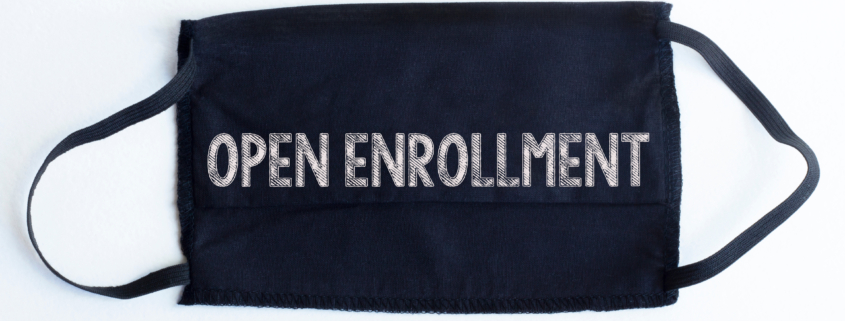What is open enrollment?
Open enrollment is a period of time each year when you can sign up for health insurance or change your plan. If you are enrolled in a plan that is provided by an employer, open enrollment can also be an opportunity to disenroll if you no longer want the coverage.
There are a lot of common misconceptions about open enrollment that leave individuals stressed out and confused. Now it is true that if you don’t sign up for health insurance during open enrollment, you probably are ineligible for health insurance until the next open enrollment period. This is unless you experience a qualifying event. These life events can include moving from one city to another, having a child, recent marriage or even celebrating you 26th birthday!
It’s recommended that you consult with you agent 3-4 months prior to your open enrollment period. This will enable you to express any issues with your current plan and changes you would like to make when re-enrolling if there are any. This will also allow you to complete a needs assessment in order to see if you have a qualifying life event. These life events change each year, one year one life event may qualify for a change of plan while the next it does not.
When is open enrollment?
Your open enrollment period depends on the health insurance plan you’re currently enrolled in. Below are some of the different options and their enrollment periods so that you can be better prepared for when they arrive.
- Medicare open enrollment (for Medicare Advantage and Part D plans) runs from October 15 to December 7 each year, and there is a separate open enrollment period from January 1 to March 31 for people who already have Medicare Advantage.
- Job-based health insurance open enrollment periods are set by your employer and can happen at any time of the year. However, it’s most common for employers to have their open enrollment period in autumn so the new coverage begins on January 1 of the next year. Check with your supervisor or HR manager to see when your employer specific open enrollment period is within the first month of your employment.
- Open enrollment in the individual market (on and off-exchange) runs from November 1 to December 15 in most states. This is the schedule followed by HealthCare.gov, which is the exchange platform that’s used in 38 states as of 2020 (dropping to 36 for 2021, as Pennsylvania and New Jersey will be running their own exchange platforms).
- Still pertaining to individual health insurance options, The District of Columbia and the other 12 states (14 in 2021) have more flexibility with their enrollment schedules, and most of them tend to offer longer enrollment windows. DC, Colorado, and California have permanently extended their enrollment windows, and a few other state-run exchanges have already announced extensions to the open enrollment period for 2021 individual market health plans.
What are my options if I miss open enrollment?
Millions of Americans each year miss their annual open enrollment periods due to a variety of factors. In my years as an agent I have seen this bring stress not only to individuals but to their loved ones as well. Being without insurance is one of the more terrifying realities many Americans face each year. At All Lines Business Solutions we aim to provide families and individuals the sense of security in knowing that their are other short term options available.
- Short-term health insurance doesn’t use open enrollment periods. Short-term insurance or private healthcare isn’t regulated by the ACA, and plans are available year-round in states that allow them (medical underwriting is used to determine eligibility for coverage, and short-term plans generally don’t provide any coverage for pre-existing medical conditions). There are 11 states where short-term health plans aren’t available, and numerous states that impose restrictions on short-term plans that go beyond what the federal government requires.
- A large majority of these short-term options provide next day coverage, low monthly premiums and built in supplements that help tackle the cost of yearly medical bills. Many of our clients turn to private health care options in order to bridge gaps in times of transition.
- As stated prior, there are some drawbacks of these short term options. Pre-existing conditions in most cases are not covered, individuals over 65 are typically not covered and the networks provided by obscure carriers may be very restrictive to some located in rural areas. As always you should consult with your agent and do your own individual research on the plans being offered to you. With short term insurance options however they do offer built in peace of mind with the option to cancel at anytime. Refunds are typically granted if cancelled within a 5 day business window or before a claim is filed for added protection to the consumer.
How can All Lines Business Solutions help me during open enrollment?
Our agents are licensed to sell and consult for Medicare, Medicare advantage, ACA/Obamacare, and private health insurance. We will work alongside clients to find the best plan for their needs as we are licensed with known carriers like Humana, Aetna, Anthem Blue Cross Blue Shield, United Healthcare & more. After enrollment our agents will work alongside you while enrolled to locate doctors and pharmacies within your network as well as make any changes to your current plan if and where possible.
[contact-form to=”Franklin@simplifyingbusinesses.com” subject=”Blog Lead”][contact-field label=”Name” type=”name” required=”1″][contact-field label=”Email” type=”email” required=”1″][contact-field label=”Which insurance product do you need more information about?” type=”checkbox-multiple” required=”1″ options=”Medicare,ACA/Obamacare,Private Healthcare “][contact-field label=”List specific carriers your interested in, medications you are taking, doctors you are seeing and other information about your insurance needs below so that we better know how to assess your needs. ” type=”textarea”][/contact-form]










